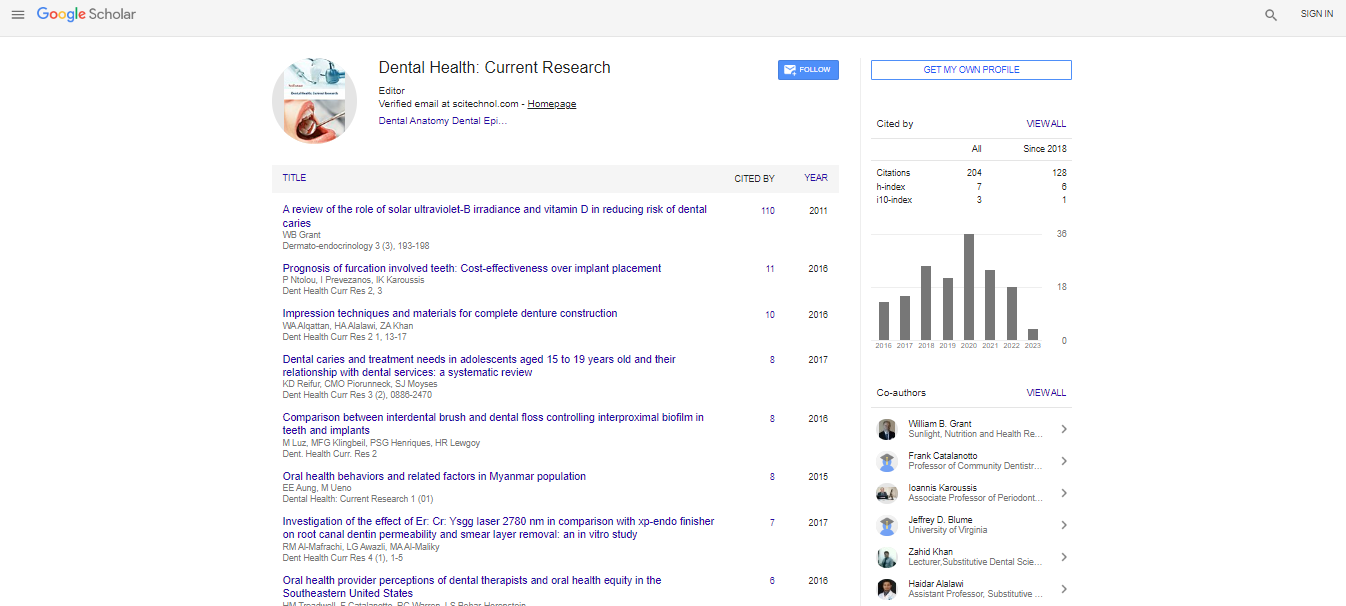Opinion Article, Dent Health Curr Vol: 9 Issue: 1
A Comprehensive Guide to Managing Dental Fractures and Chipped Teeth
Reza Hamid*
Division of Periodontology, University of Alberta, Edmonton, Alberta, Canada
*Corresponding Author: Reza Hamid
Division of Periodontology, University
Alberta, Edmonton, Alberta, Canada
E-mail: hamidr@ ualberta.ca
Received date: 22 January, 2023, Manuscript No. dhcr-23-91842;
Editor assigned date: 24 January, 2023, Pre QC. dhcr-23-91842 (PQ);
Reviewed date: 14 February, 2023, QC No. dhcr-23-91842;
Revised date: 21 February, 2023, Manuscript No. dhcr-23-91842 (R);
Published date: 28 February, 2023, DOI: 10.4172/2470-0886.1000137
Citation: Hamid R (2023) A Comprehensive Guide to Managing Dental Fractures and Chipped Teeth. Dent Health Curr 9:1.
Description
Dental trauma refers to injuries to the teeth and supporting structures, such as the gums, lips, and jawbone. Dental trauma can occur as a result of various incidents, including accidents, sports injuries, fights, and falls.
Dental trauma can have a significant impact on an individual's oral health, as well as their overall well-being. Injuries to the teeth and supporting structures can cause pain, discomfort, and functional limitations, such as difficulty chewing or speaking. Dental trauma can also affect a person's self-esteem, particularly if the injury results in visible damage to the teeth or gums.
Prompt treatment is essential in managing dental trauma and preventing further complications. In cases of a knocked-out or avulsed tooth, immediate action can significantly increase the chances of saving the tooth. Additionally, preventative measures such as wearing a mouth guard during high-risk activities like sports can help reduce the risk of dental trauma. The severity of dental trauma can range from minor chips or fractures to complete loss of a tooth.
Treatment options for different types of dental trauma
Fractured or chipped teeth: This can occur due to a hard impact on the tooth, such as during a sports injury or fall. Minor chips or fractures may be treated with dental bonding or filling, while more severe fractures may require a dental crown or veneer. Root canal therapy may also be necessary if the fracture extends into the pulp of the tooth.
Knocked-out tooth: This occurs when a tooth is completely dislodged from its socket due to a blow or accident. A knocked-out tooth should be replanted as soon as possible to increase the chances of saving the tooth. The tooth should be handled carefully, avoiding touching the root, and gently rinsed with water if dirty. It can then be repositioned in the socket and held in place with a splint or wire for several weeks to allow for healing.
Avulsed tooth: This refers to a tooth that has been completely knocked out of its socket. A completely knocked-out tooth should be stored in milk or a tooth preservation kit and brought to a dentist immediately. The dentist may be able to replant the tooth and stabilize it with a splint.
Luxated tooth: This occurs when a tooth has been moved from its normal position in the jawbone, but is still attached to the socket. A luxated tooth may require repositioning and splinting, and in some cases, root canal therapy may be necessary if the tooth pulp has been damaged.
Conclusion
Depending on the severity of the injury, the dentist may recommend the various treatments, such as root canal therapy, splinting, or tooth replacement. It is important for individuals to be aware of the risks of dental trauma and to take necessary precautions to protect their teeth and gums. Seeking regular dental care can also help to identify and address any underlying issues that may increase the risk of dental trauma. Preventative measures such as wearing a mouth guard during high-risk activities like sports can help reduce the risk of dental trauma. The appropriate treatment for dental trauma will depend on the specific injury, and it is important to seek prompt dental attention in the event of an injury to the teeth or supporting structures.
 Spanish
Spanish  Chinese
Chinese  Russian
Russian  German
German  French
French  Japanese
Japanese  Portuguese
Portuguese  Hindi
Hindi 